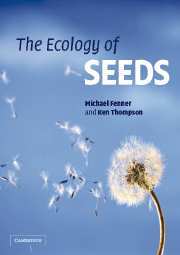Description
The Ecology of Seeds
Authors: Fenner Michael, Thompson Ken
A succinct review of the ecological aspects of seed biology.
Language: English
Subject for The Ecology of Seeds:
Approximative price 61.25 €
Subject to availability at the publisher.
Add to cart
Publication date: 02-2005
264 p. · 16.6x24.9 cm · Paperback
264 p. · 16.6x24.9 cm · Paperback
Description
/li>Contents
/li>Biography
/li>
What determines the number and size of the seeds produced by a plant? How often should it reproduce them? How often should a plant produce them? Why and how are seeds dispersed, and what are the implications for the diversity and composition of vegetation? These are just some of the questions tackled in this wide-ranging review of the role of seeds in the ecology of plants. The authors bring together information on the ecological aspects of seed biology, starting with a consideration of reproductive strategies in seed plants and progressing through the life cycle, covering seed maturation, dispersal, storage in the soil, dormancy, germination, seedling establishment, and regeneration in the field. The text encompasses a wide range of concepts of general relevance to plant ecology, reflecting the central role that the study of seed ecology has played in elucidating many fundamental aspects of plant community function.
Preface; 1. Life histories, reproductive strategies and allocation; 2. Pre-dispersal hazards; 3. Seed dispersal; 4. Soil seed banks; 5. Seed dormancy; 6. Germination; 7. Post-dispersal hazards; 8. Seedling establishment; 9. Gaps, regeneration and diversity; References; Index.
Michael Fenner is senior lecturer in ecology in the School of Biological Sciences at the University of Southampton, UK.
Ken Thompson is a research fellow and an honorary senior lecturer in the Department of Animal and Plant Sciences at the University of Sheffield, UK.
Ken Thompson is a research fellow and an honorary senior lecturer in the Department of Animal and Plant Sciences at the University of Sheffield, UK.
© 2024 LAVOISIER S.A.S.
These books may interest you

Advances in Plant Dormancy 105.49 €

Advances in Plant Dormancy 105.49 €


